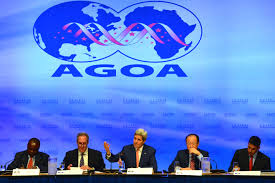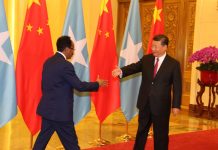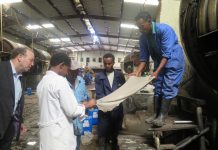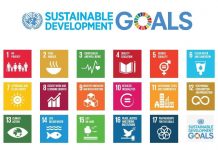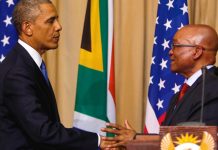It takes a village to get AGOA renewed…This has always been a team effort to get AGOA moving over the last fifteen years, and you all know what the record of AGOA is.
Under AGOA, exports from sub-Saharan Africa to the United States have more than tripled. Non-oil exports have grown four-fold, as has U.S. foreign direct investment in the region, and all of this has contributed to the diversification and competitiveness of sub-Saharan Africa economies and supporting hundreds of thousands of jobs there.
And yet we know we can do much better going forward. This trade is still very small and we have a long way to go to take advantage of this all.
The U.S. has benefited also from AGOA. Since 2000, U.S. exports have grown four-fold, from six billion dollars to twenty-four billion dollars, and those exports have supported nearly 120,000 jobs here in the U.S. So while this is a preference program, and while we’re taking exports duty free from Africa, we, too, are benefiting from this relationship and that’s something that we need to make clear as we move forward.
Alongside these accomplishments, we’ve learned a lot of lessons about AGOA. And one of the lessons has been: we shouldn’t wait until the eleventh hour to get it renewed. Businesses sometimes take six months or even twelve months to make investment decisions, to place orders. And as we saw in 2012, when we delayed the renewal of the third-country fabric provision, we saw imports of AGOA products decline by 25 percent, and we already see right now that the costs start hitting well before the actual deadline.
And those costs are human costs. They’re costs in jobs and factories closed, in investments deferred. And I was very pleased to meet with a number of African trade ministers who were here—I guess it was last week—and who were making the rounds up here to try and make clear to members of Congress and staff how important it is, not just to have the seamless renewal of AGAO, but the early renewal of AGOA as well. And that is a message we’re taking to Congress as well.
Yesterday I had the pleasure of testifying before the Senate Finance Committee and the House Ways and Means Committee and I was pleased to see a number of African ambassadors there. But I was also very pleased to hear Chairman [Paul] Ryan of the House Ways and Means Committee make it clear that he was seeking not just the seamless renewal, but the early renewal of AGOA, and we’re going to want to work with Congressman [Charles B.] Rangel, Congresswoman [Karem] Bass and the other supporters—the other bipartisan, bicameral supporters of AGOA—to make sure that happens.
Let me say something about the bicameral, bipartisan support for AGOA because we had quite a remarkable meeting several months ago—it’s the first meeting I’ve been in of this sort. It was about twenty members—half senators, half members of the House; half Republican, half Democrat—and all very supportive of moving ahead with AGOA’s renewal. And so I’m very optimistic we’ll get there. We now just need to find the right vehicle, get the right program in place and move it ahead.
One of the lessons that we take from this review of AGOA that we did, this year-long—actually, more than a year-long—review of AGOA that we did with African leaders, African ministers, business people from Africa and the United States, civil society organizations, is that the tariff preferences, as important as they are, need to be part of a larger trade and investment strategy which includes capacity building, trade facilitation—all of the other measures that go around just the level of tariffs to make sure that people can take advantage of the access to our markets. The access is not enough if they don’t have the capacity to fully take advantage of it.
And we’re looking at that. The president, as you know, around the Africa Leaders Summit launched an interagency effort to have a broad-based trade capacity building program, and that work is ongoing. We’ve been very much engaged in helping to promote entrepreneurs through our Young African Leaders Initiative to make sure there are entrepreneurs in Africa who will take advantage of this opportunity, and make sure that they are building businesses and sending products to the United States.
We’re also looking to expand our engagement with Africa in other ways—through, for example, our partnership with the East African Community; our Trade Africa partnership, potentially expanding that and deepening it. I just saw [Kenyan Foreign Affairs] Minister Amina Mohamed last week in Switzerland and she passed me a note that said we’ve got to get this investment agreement done. She wants to move ahead between the East African Community and the United States. We’ve got great opportunities, I think, to build that relationship as well.
Now one thing that’s clear is that AGOA is really a stepping stone that can take us even closer to a more advanced trade and investment relationship going forward. A lot has changed in Africa. Since 2000, the economy of Africa has nearly doubled in size, growing about six percent on average, and the IMF predicts that it will be continued strong growth in much of sub-Saharan Africa this year. It’s got one of the fastest growing middle classes and, it’s becoming one of the largest contributors to the world’s workforce by 2050.
And Africa’s economic relationships with other partners, with other countries, are changing as well. It’s got economic partnership agreements or free trade agreements with the EU, and that is creating an issue because European companies are having access to Africa that our companies don’t have and we need to address that issue as we move forward.
In addition, the EU and Canada have both revised their Generalized System of Preferences program to graduate, or to take a different look at certain emerging economies. We have not yet done that. And there’s a lot of activity going on outside of Africa. We've got TPP [Trans-Pacific Partnership] and TIFAs [Trade and Investment Framework Agreements]. Across Asia there are bilateral, trilateral FTAs being negotiated. There’s the RCEP [Regional Comprehensive Economic Partnership] agreement being negotiated.
In Latin America, the Pacific Alliance is moving ahead to further liberalization in parts of this hemisphere both in trade and the movement of people and the connectivity of electricity. In Geneva, around the WTO, we’ve got plurilateral agreements, like the Information Technology Agreement, the Services Agreement, the Environmental Goods Agreement—all that are proceeding. And just recently we’ve had discussions over the last several days with a number of trade ministers and the director general of the WTO about how to potentially recalibrate the level of ambition around the Doha Development Round to see if we can move that forward. [Trade and INdustry] Minister Rob Davies of South Africa was a key proponent of having us take a hard look at that.
There’s a lot of activity going on all around the world in terms of shaping the future of the global trading system, and we don’t want Africa to be left behind. And so we need to get AGOA renewed. We also need to lay the foundation for how to think about how that relationship might evolve over time into a more permanent, reciprocal set of arrangements with particular countries over the medium and long term. And we’re hoping that as AGOA gets renewed, as GSP gets renewed, we can begin to have that kind of a dialogue with our African partners as well.
The above is an excerpt of keynote remarks delivered by U.S. Trade Representative Michael Froman at the Africa Policy Breakfast held January 28 in Washington, D.C., under the theme AGOA and Beyond: The Future of U.S.-Africa Trade.


